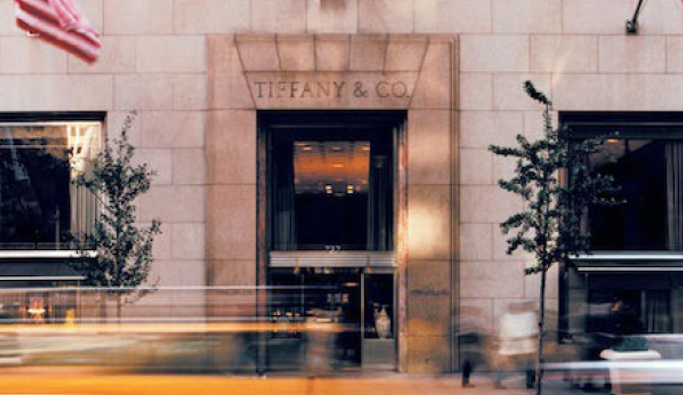What would an LVMH Tiffany acquisition mean for the luxury business?
29-October-2019 | By: SARAH JONES
Image Credit: Tiffany & Co.
Tiffany is being courted by LVMH.
Conglomerate LVMH Moët Hennessy Louis Vuitton has made a proposal to acquire jeweler Tiffany & Co., in a move that could further the group’s position in American luxury.
Tiffany’s board is reviewing an unsolicited proposal from LVMH, which values the company at $14.5 billion. LVMH is already the largest luxury group by volume, with close to $52 billion in revenues last year, and Tiffany could help solidify its leading position in the luxury business if a deal comes to fruition.
"Tiffany is one of the last iconic luxury jewelry brands and it is natural that LVMH would want to own it," said Elsa Berry, managing director of Vendôme Global Partners, New York. "This has been on Bernard Arnault’s radar for many, many years.”
"It would make lots of sense for LVMH as they have now successfully integrated Bulgari," she said. "And this is an important next step when compared to Richemont’s presence in the jewelry sector.”
"Tiffany would reinforce LVMH’s presence in the U.S. market, the number two growth market for LVMH behind Asia. There are also many synergies that LVMH can bring to Tiffany both geographically, retail wise and with its in-house expertise." Ms. Berry is not affiliated with Tiffany or LVMH, but agreed to comment as an industry expert. Tiffany and LVMH were reached for comment.
Tiffany and LVMH disclosed the offer on Oct. 28 in response to what LVMH called “market rumors.” The group stressed, "There can be no assurance that these discussions will result in any agreement."
While a statement from LVMH points to “preliminary discussions” about a potential sale, Tiffany said that it has not entered discussions with the group.
Instead, Tiffany says its board is reviewing LVMH’s offer. The company has tapped Centerview Partners and Goldman Sachs as financial advisors and Sullivan & Cromwell as its legal advisor.
"While the parties are not in discussions, Tiffany’s board of directors, consistent with its fiduciary responsibilities, is carefully reviewing the proposal, with the assistance of independent financial and legal advisors, to determine the course of action it believes is in the best interests of the company and its shareholders," Tiffany said in a statement. "Tiffany shareholders need take no action at this time.”
"Tiffany is successfully executing on its business plan and remains focused on achieving its goal of becoming The Next Generation Luxury Jeweler," it said.
The proposed offer would see LVMH pay Tiffany $120 per share in cash, for a total valuation of $14.5 billion. This would mark LVMH’s largest purchase since it acquired family-owned Bulgari in 2011 for $5.2 billion.
Tiffany’s net sales in 2018 were $4.4 billion. The Americas and the U.S. in particular are the largest markets for the New York-based jeweler, with the region accounting for 44 percent of global sales last year.
Image Credits: Tiffany & Co.
Recently, the jeweler’s sales have slowed, with much of the decrease tied to lower foreign tourist demand in key markets including the U.S. and Asia.
"Tiffany’s is failing from a product point of view and not gaining consumer market since LVMH hired away the former vice president of design and creative director at Tiffany & Co., Francesca Amfitheatrof," said Rebecca Miller, founder/CEO of Miller & Company, New York. "She is best known for the clean-lined T collection created for Tiffany’s, which remains a bestseller.
"A positive for LVMH to acquire Tiffany’s is that they hired Francesca to serve as their chief artistic director of jewelry and watches and value her knowledge of Tiffany’s and her talent," she said. "She has a proven track record and recently launched Thief and Heist, consisting of a single piece, called the 'Tag,' an affordable silver and nylon bracelet. Francesca brings a much needed fresh approach to jewelry design, at a price point.
"A potential negative is that the DNA of Tiffany may be disoriented under LVMH. They have a particular manner by which they navigate brand acquisitions. Will they wrap Tiffany’s into this fold or will they let them remain more autonomous?"
Despite Tiffany's recent downturn, the addition of Tiffany would strengthen LVMH’s position in the jewelry category.
Last year, LVMH’s watches and jewelry division, which includes Bulgari as well as Chaumet and Fred, rose 12 percent on an organic basis.
LVMH rival Richemont has also made an investment in jewelry this year, acquiring Buccellati from Gangtai Group.
In addition to bolstering LVMH’s jewelry portfolio, this offer would give the group a greater foothold in the U.S. market, which accounted for 24 percent of LVMH's total sales last year.
LVMH’s portfolio is primarily centered on European houses. The group currently has a controlling stake in New York-based label Marc Jacobs, and its LVMH Luxury Ventures has recently invested in New York-based brand Gabriela Hearst and Los Angeles-based streetwear label Madhappy.
"Tiffany’s is one of the few remaining iconic global luxury brands with a powerful authentic New York/American origins foundation," said Allen Adamson, cofounder of Metaforce and adjunct professor at NYU Stern, New York. "Tiffany also has an incredibly distinctive signature marketing asset in their ownable blue box to help the brand stand out in cluttered marketplace.
"For LVMH it balances their brand portfolio with an American iconic brand and moves them away from adependence on watches, which will be continuing to see disruption from Apple," he said.
Image Credit: Tiffany & Co.
While the U.S. has not had its own luxury groups to rival Europe’s conglomerates, a number of American labels have grown into multi-brand operations.
London- and New York-based Capri Holdings, formerly Michael Kors Holdings, has expanded with the acquisitions of Versace and Jimmy Choo. Meanwhile, Coach has grown into T apestry as it added Kate Spade and Stuart Weitzman to its group.
While both of these firms have been growing, they are still far from catching up to luxury groups such as Kering, Richemont and LVMH, with Tapestry’s most recent annual sales totaling $6.03 billion and Capri’s totaling $4.7 billion.
A Tiffany sale to LVMH would put the conglomerate even further in the lead.
"The idea of LVMH buying Tiffany’s has been in the works for a long time," Ms. Miller said. "I believe that LVMH may have made the proposal to buy Tiffany’s because their biggest asset is access to the U.S. market and an unprecedented vertical supply chain. It is world class and brilliant."
LVMH’s play for Tiffany heralds the potential for more M&A consolidation in the luxury world.
Luxury investments are different, with deals often centered on intangible assets such as branding or the desire for a relationship, according to a panel at the FT Business of Luxury Summit.
The market capitalizations for the biggest luxury companies have risen significantly in the last decade, often driven by mergers and acquisitions. Per the session on May 21 moderated by Financial Times Milan correspondent Rachel Sanderson, luxury firms will continue to see M&A activity, partly due to the business’ need for evolution.
"This would be good news [for the luxury business] as it shows that LVMH is confident in the luxury growth prospects and that it feels that the time is right to spend multi-billion dollars today on such an acquisition – a good sign for other buyers and for luxury participants in general," Ms. Berry said.
Many independent luxury houses have linked up with conglomerates to be more competitive.
"My view is that [Tiffany] will sell based on LVMH’s proven track record in managing and growing iconic global brands," Mr. Adamson said. "Scale is critical for global success in the luxury, and it’s hard for a single brand company to play and win in this game."
LVMH has previously tried to acquire other competitive multi-billion dollar companies.
The group ended up in a four-year-long legal battle with French group Hermès after it secretly acquired a 17.1 percent stake in the company. LVMH eventually settled in 2014, and the shares in question were distributed to its stockholders.
"I believe that Tiffany’s board wants to sell to LVMH, but are looking for a higher price," Ms. Berry said."LVMH is the biggest luxury group in the world and the Tiffany board knows that LVMH could be instrumental to Tiffany’s future. So, this is a good buyer, but not yet an excellent price," she said. "The board’s fiduciary responsibility is to maximize the price for their shareholders, and I believe they know they can get more than has been offered so far.
"For Tiffany, this would be a great owner and there is much ‘low hanging fruit’ that LVMH can fix and reap the benefits of such an acquisition.”



